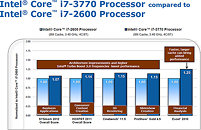Thursday, December 1st 2011

Ivy Bridge Official Benchmarks - Markedly Better Performance Than Sandy Bridge
Previous preliminary reports have suggested that the forthcoming Ivy Bridge CPUs will have single threaded performance on par with the existing Sandy Bridge CPUs and will mainly deliver improvements to power consumption and integrated graphics - nothing for PC enthusiasts to get excited about. However, in leaked documents sent to partners, Intel have now revealed official performance figures for IB and they look rather good. They've produced a raft of benchmarks, which reveal improvements such as 56% in ArcSoft Media Expresso, 25% in Excel 2010 and a 199% gain in the 3D Mark Vantage GPU benchmark. Unfortunately, they haven't released any benchmarks based on high performance 3D games, but it's probably safe to say that they will be similarly improved. Now, on to the benchmarks, which compare their new 3.4 GHz i7-3770 (4 cores + HT) with the current 3.4 GHz i7-2600, also with 4 cores + HT:
Finally, TechPowerUp will keep a lookout for those all-important gaming benchmarks.
Source:
xbit labs
- +7% higher overall SYSmark 2012 score
- +14% higher overall HDXPRT 2011 score
- +15% higher Cinebench 11.5 score
- +13% better ProShow Gold 4.5 result
- +25% faster performance in Excel 2010
- +56% faster performance in ArcSoft Media Expresso
- +192% higher overall 3DMark Vantage score
- +17% faster performance in 3DMark Vantage CPU benchmark
- +199% faster performance in 3DMark Vantage GPU benchmark
- Intel's new 22nm 3D Tri-Gate technology. More on this here
- Enhanced AVX acceleration
- IGP performance improved by 30% compared to its predecessor
- IGP supports DX11 and OpenCL 1.1
- PCI Express 3.0 x16 interface, including a PCI Express 2.0 x4 controller
Finally, TechPowerUp will keep a lookout for those all-important gaming benchmarks.


66 Comments on Ivy Bridge Official Benchmarks - Markedly Better Performance Than Sandy Bridge
www.techpowerup.com/155826/Intel-Ivy-Bridge-Desktop-Processor-Models-Tabled.html
That's 3.5ghz vs 3.4ghz.
as for the the HD graphics. i only wish they did compared it to HD3000, i was hoping HD4000 probably would perform better than hd5450 and or close to a 9500gt.
:eek: Intel is confusing us.
MInd you, if these figures are real, releasing a muc hfaster CPU for the same price is seomthing I have no problems with Intel doing :D More for your dollar is always good!Considering 1155 CPUs clock better than previous parts on average, and cram 1366 tri-channel bandwidth into just two channels, SKT1155 has alot to offer other than just the power consumption side of things. Ivy Bridge is only going ot make that deal even sweeter.
Will they be good deals like SB, or overpriced like SB-E?